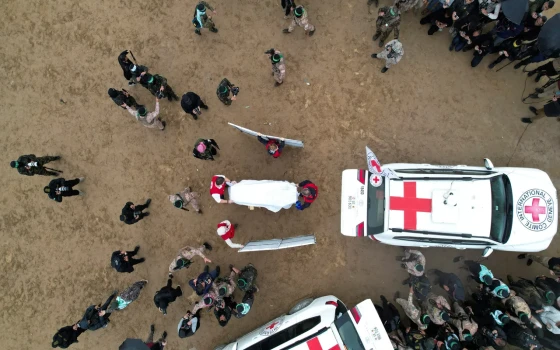
Israel Revolts: Massive Protests, Prisoners' Families Threaten Escalation: Famine Confirmed in Gaza, Expected to Spread to Other Areas Within Weeks

- Europe and Arabs
- Sunday , 24 August 2025 6:45 AM GMT
Gaza - Jerusalem: Europe and the Arabs
After US President Donald Trump said during a White House press conference that the number of living hostages held by Hamas was "likely less than 20" out of 50 captured, thousands of Israelis gathered on Saturday in front of the Ministry of Defense headquarters in Tel Aviv as part of an ongoing series of protests demanding a halt to military operations in the Gaza Strip and the acceleration of negotiations for a prisoner exchange deal that would lead to the return of the captives.
The demonstrators held up signs reading "Stop the fighting before you lose us" and "No victory without survivors," a reference to growing concerns about the deteriorating conditions of the captives, amid assurances from their families that the ongoing war undermines any chance of their release. According to a report by the Brussels-based Euronews website on Sunday, the "Israeli Prisoners' Families Committee" announced an escalation in popular protests in the coming days, with a call for a series of national demonstrations on Sunday and Tuesday in major cities. The aim is to put pressure on the government to adopt a clear and urgent negotiation plan.
In parallel, demonstrators blocked Highway 90 south of Kiryat Shmona, demanding an end to the war and the return of the detainees.
The committee reported that more than a million Israelis participated in these protests, in what was described as the largest popular mobilization around the hostage issue since the beginning of the crisis.
In the demonstration on Saturday, representatives of the families warned that "military control over the entire Gaza Strip would be a humanitarian and strategic catastrophe," noting that "the continued ground advance weakens the negotiating position and makes Hamas less inclined to negotiate, which directly threatens the lives of the hostages." The spokesperson for the commission accused the government headed by Benjamin Netanyahu of "prioritizing political calculations over the lives of the prisoners," saying, "They are not only condemning our sons to captivity, but also to gradual death in the shadow of a war they claim has achieved its goals, while no one returns home."
He added, "Netanyahu is waging an eternal war with taxpayers' money and the blood of our soldiers, while neglecting negotiations that could save our sons."
Hamas released a new video of hostage Eviatar David on Friday, just one day after Palestinian Islamic Jihad released a video of hostage Rom Braslavsky. The Times of Israel described the condition of the two hostages as critical.
US President Donald Trump said during a White House press conference on Friday that the number of living hostages held by Hamas is "likely less than 20," out of 50 captured. Trump explained that "two more hostages may have lost their lives," adding that "Hamas has begun rejecting immediate deals and is now insisting on strict conditions, offering only 10 hostages for release in exchange for any settlement."
In response, Israel's coordinator for hostage affairs, retired Major General Gal Hirsch, denied that security services had confirmed information about the deaths of new hostages. He confirmed that "the documented number of living hostages remains at 20," noting that "two of these cases are of extreme concern, while 28 others have been confirmed dead."
On the other hand, an international classification of food insecurity, in which the United Nations participates, confirmed the occurrence of famine in the Gaza Strip and predicted it would spread to the governorates of Deir al-Balah and Khan Yunis by the end of September.
The Integrated Food Security Phase Classification stated that more than half a million people in the Gaza Strip are facing catastrophic conditions, i.e., Phase 5 of the classification*, characterised by extreme hunger, death, destitution, and extremely critical levels of acute malnutrition. The classification stated that another 1.07 million people (54% of the population) are facing Phase 4, which is the "Emergency" stage of acute food insecurity. 396,000 (20% of the population) are facing Phase 3, which is the "Crisis" stage of acute food insecurity.
The Integrated Food Security Phase Classification (IPC) is a global initiative involving UN agencies, regional partners, and relief organizations. It classifies food insecurity into five phases, the most severe of which is famine, which ranks fifth.
The classification predicts that conditions in Gaza will deteriorate between mid-August and the end of September 2025, with famine extending to Deir al-Balah and Khan Yunis.
During this period, approximately one-third of the population (641,000 people) are expected to face catastrophic conditions, which is Phase 5 of the classification. Acute malnutrition is also expected to continue to worsen rapidly.












No Comments Found